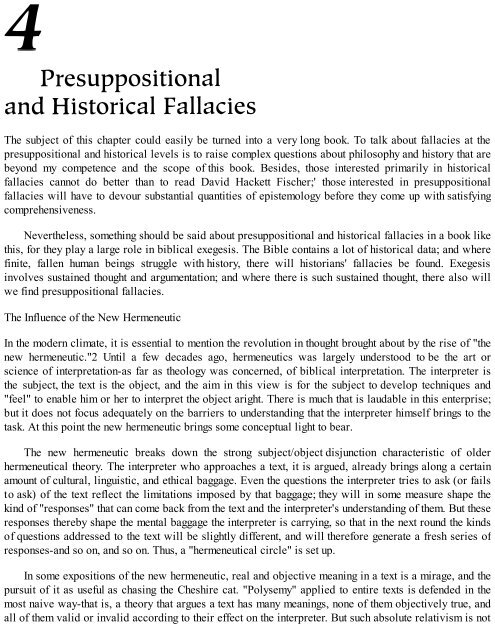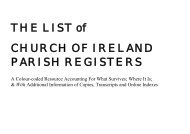Exegetical Fallacies - D. A. Carson
Exegetical Fallacies - D. A. Carson
Exegetical Fallacies - D. A. Carson
Create successful ePaper yourself
Turn your PDF publications into a flip-book with our unique Google optimized e-Paper software.
The subject of this chapter could easily be turned into a very long book. To talk about fallacies at the<br />
presuppositional and historical levels is to raise complex questions about philosophy and history that are<br />
beyond my competence and the scope of this book. Besides, those interested primarily in historical<br />
fallacies cannot do better than to read David Hackett Fischer;' those interested in presuppositional<br />
fallacies will have to devour substantial quantities of epistemology before they come up with satisfying<br />
comprehensiveness.<br />
Nevertheless, something should be said about presuppositional and historical fallacies in a book like<br />
this, for they play a large role in biblical exegesis. The Bible contains a lot of historical data; and where<br />
finite, fallen human beings struggle with history, there will historians' fallacies be found. Exegesis<br />
involves sustained thought and argumentation; and where there is such sustained thought, there also will<br />
we find presuppositional fallacies.<br />
The Influence of the New Hermeneutic<br />
In the modern climate, it is essential to mention the revolution in thought brought about by the rise of "the<br />
new hermeneutic."2 Until a few decades ago, hermeneutics was largely understood to be the art or<br />
science of interpretation-as far as theology was concerned, of biblical interpretation. The interpreter is<br />
the subject, the text is the object, and the aim in this view is for the subject to develop techniques and<br />
"feel" to enable him or her to interpret the object aright. There is much that is laudable in this enterprise;<br />
but it does not focus adequately on the barriers to understanding that the interpreter himself brings to the<br />
task. At this point the new hermeneutic brings some conceptual light to bear.<br />
The new hermeneutic breaks down the strong subject/object disjunction characteristic of older<br />
hermeneutical theory. The interpreter who approaches a text, it is argued, already brings along a certain<br />
amount of cultural, linguistic, and ethical baggage. Even the questions the interpreter tries to ask (or fails<br />
to ask) of the text reflect the limitations imposed by that baggage; they will in some measure shape the<br />
kind of "responses" that can come back from the text and the interpreter's understanding of them. But these<br />
responses thereby shape the mental baggage the interpreter is carrying, so that in the next round the kinds<br />
of questions addressed to the text will be slightly different, and will therefore generate a fresh series of<br />
responses-and so on, and so on. Thus, a "hermeneutical circle" is set up.<br />
In some expositions of the new hermeneutic, real and objective meaning in a text is a mirage, and the<br />
pursuit of it as useful as chasing the Cheshire cat. "Polysemy" applied to entire texts is defended in the<br />
most naive way-that is, a theory that argues a text has many meanings, none of them objectively true, and<br />
all of them valid or invalid according to their effect on the interpreter. But such absolute relativism is not



